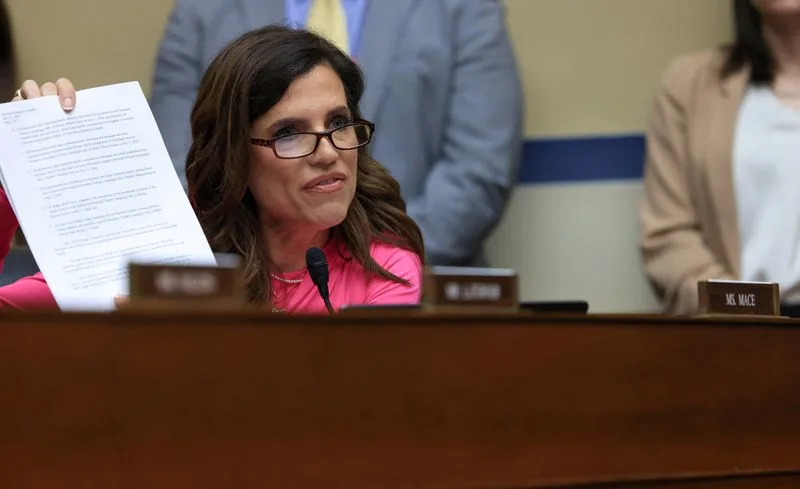
Gov. Janet Mills gives her state of the budget address in January 2025. (Photo by Jim Neuger/ Maine Morning Star)
Amid uncertainty over federal funding and the impact of steeper tariffs announced by the Trump administration Friday, Maine ended the fiscal year with a $152.2 million general fund surplus, nearly $60 million more than in 2024.
The Maine Department of Administrative and Financial Services reported this figure on Friday, following the end of the fiscal year on June 30. The state’s Budget Stabilization Fund, also known as the rainy day fund, has also reached a record $1.03 billion, the maximum prescribed in statute.
Also this week, Fitch Ratings, a top international credit rating agency, upgraded its bond credit for Maine, Gov. Janet Mills and State Treasurer Joe Perry announced Friday. The agency increased Maine’s rating from “AA” to “AA+” — its second highest rating — noting the state’s “proven ability to maintain significantly improved dedicated operating reserves through a challenging budget cycle.”
“Governor Mills’ and the Legislature’s fiscal policies have allowed us to build significant cash reserves, creating flexibility and security for the state,” said Perry, who was a former Democratic state representative. “This ratings upgrade from Fitch affirms that we are on a good path.”
The news comes after Mills and the state financial office have repeatedly warned about a projected overall revenue shortfall in the coming years, arguing that the state needs to tighten its belt and avoid new major spending commitments.
In a statement to Maine Morning Star, Sharon Huntley, director of communications for DAFS, explained that the surplus comes from the current fiscal year and is not related to the biennial budget that was set in June.
Maine was facing a projected $450 million deficit, as well as an immediate funding gap to cover the cost of MaineCare, the state’s Medicaid program, when crafting that budget this year.
The Maine Legislature failed to pass emergency spending to address the short-term deficit after Senate Republicans held out support, leading to delayed payments to providers.
The Democratic majority of the Legislature then pushed through a two-year budget in March without Republican support that continued funding for state services at the same level while also providing some one-time funding for urgent needs, such as Medicaid, and in June passed a budget addition. That addition did not make as many program cuts or tax hikes as Mills requested.
One of the ways lawmakers managed to reject some of those cost-saving measures was by making use of unanticipated agency surpluses. For example, the budget paid for Medicaid in part by adding surplus cash at the end of the 2025 fiscal year into what’s called the “cascade,” a legislative authorization transferring available surplus funds at the close of the fiscal year after all statutory and financial commitments are met.
After transfers to Medicaid and other statutory priorities, Maine law requires the remaining surplus to be divided, with 80% going to the budget stabilization fund and 20% to the highway and bridge capital fund. This year’s cascade resulted in $79.4 million added to the budget stabilization fund and $33.8 million to the highway fund.
“The nearly $34 million will be used to ensure this year’s construction as defined in our three-year work plan is adequately funded,” said Bruce Van Note, commissioner of the Maine Department of Transportation, who is retiring this month. “The plan includes projects that will improve roads and bridges, enhance safety, and increase economic opportunity through upgraded transportation infrastructure across the state.”
While celebrating the savings and upgraded credit rating, Mills highlighted in a statement that uncertainty with federal funding remains.
“Over the past six years, my administration has worked hard to invest in Maine people, improve our economy, and produce responsible, balanced state budgets,” Mills said. “I look forward to maintaining this progress for Maine people, despite the needless economic challenges and uncertainty coming from Washington.”
Maine has faced funding cuts under President Donald Trump’s administration, as have other states, in addition to what’s widely been considered retribution from the Trump administration over the state’s protections for transgender people.
The administration also went ahead with implementing its sweeping tariffs that had been postponed until Friday. Now amounting to import taxes at levels not seen since the 1930s, these tariffs are expected to hurt Maine’s economy, notably due to Canada as the state’s largest trading partner and major source of tourism.
Because of uncertainty with federal funding and the economy, specifically impacts from tariffs, Maine’s Revenue Forecasting Committee discussed this spring possibly revising projections ahead of its next scheduled update on Nov. 1 but has so far made no such plans.
As the end of the federal fiscal year approaches on September 30, U.S. Congress is also facing a possible government shutdown if it fails to pass appropriations bills by then, indicating the likelihood of another stop gap funding bill to avoid that.








Comments